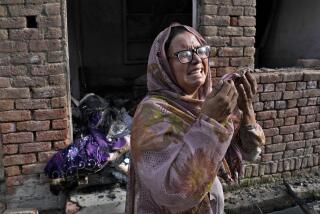ISLAM RISING : Law and Rights : The ‘Blasphemous’ Roar of a Mythical Lion : Pakistani writer’s censorship case is a cause celebre for those who worry about the rising influence of Muslim fundamentalists on parliamentary democracy.
- Share via
KARACHI, Pakistan — The soldiers came for Akhter Hameed Khan at 1 a.m., clomping up the four flights of stairs in heavy boots, banging on his door and dragging the 78-year-old man down to a police station to file charges against him.
His crime? An eight-line Urdu poem, published in 1987 in an Oxford University Press book of children’s verse.
“It is an allegory about a lion and a fool who fed the lion and trusted him, and then the lion ate him,” said Khan, one of Pakistan’s best-known sociologists. “The idea is, any nation that worships the military will come under the heel of the military. It is a universal message.”
Not to Khan’s accusers. They insist the nursery rhyme deliberately defames the Prophet Mohammed and his son-in-law, the fourth caliph of Islam, who was known as the Lion of Allah. That makes it blasphemy, a crime punishable by death.
“I was charged with blasphemy, being an enemy of Pakistan and an Israeli agent,” said Khan, a tall, energetic Muslim who runs a widely respected slum improvement project in northern Karachi.
The charges were dropped last November, a month after they were filed, but Khan wasn’t off the hook. A Muslim clergyman, living 400 miles away in the Punjab, complained that Khan insulted the Holy Prophet in an interview with an Indian magazine. Khan denied giving such an interview, and none was found in any Indian publication, but the local court has refused to dismiss the charge.
To many Pakistanis, Khan’s case is a clear example of the rising influence of zealous Muslim fundamentalists in a modern parliamentary democracy. It proves, the critics say, that Islamic extremism is a direct threat to Western-style civil liberties and human rights.
“It is extremely dangerous,” warned Sabih Uddin Ahmed, vice chairman of the Human Rights Committee of Pakistan. “The trend is medieval. There’s no doubt about it. There’s a move toward the way Iran went.”
But other Pakistanis say the case shows how weak and selectively enforced Pakistan’s religious laws really are. Neither Khan nor anyone else has been jailed for blasphemy. Khan calls his case “a minor irritant,” not a cause celebre.
“The whole campaign was organized by an employee whom I dismissed,” Khan said angrily. “It is a misuse of legal machinery. It has nothing to do with religion or Islam or any such thing.”
Still, the case highlights the special pressure Pakistan has faced since independence in 1947 between the Western-oriented political and business elites and conservative clerics with roots in rural villages. Politicians have tried to wrap their regimes in religious legitimacy by letting mullahs impose strict ways on a secular society. The extent of their success is another matter, however.
“If a person commits theft, then Islam says his hand should be cut,” said Ghafour Ahmed, vice president of the Jamaat-i-Islami, the country’s oldest and largest fundamentalist party. “As a result, there is a perception in the West that Pakistan is full of people with one hand, or people who were stoned to death. This is not true. It has never happened.”
One reason is that Jamaat-i-Islami has never won significantly in Pakistani elections. In the last election, fundamentalists won only 10 of the 237 seats in the National Assembly. Unlike Iran, where a most citizens define Islam the same way, Pakistan’s Muslim community is divided into numerous sects and sub-sects.
Indeed, fundamentalists “are not very respected,” said Iqbal Jaffery, city editor of the News, the nation’s largest English-language newspaper. “No decent person will give his daughter to marry a mullah.”
That’s not to suggest Islamic laws have no impact. Their most serious effect has been on the lives of women.
It began in 1979 when the military dictator, Gen. Zia ul-Haq, sought support from mullahs by ordering harsh Hudood (literally “limitation”) laws. The most important law defined adultery as intercourse between any two unmarried adults--being single or consenting didn’t matter. It became a crime punishable by stoning to death under religious law or 10 years in prison under civil law.
Nearly all prosecuted under the law were women. None were stoned to death, but Nausheen Ahmad, a human rights lawyer, says the number of women in Pakistani prisons jumped from 70 in 1980 to at least 6,000 a decade later, mostly under Hudood charges.
“In some cases, women who are raped are convicted of adultery,” she said. “In one case, a blind girl accused her employer of rape. Because she was blind, the court refused to accept her identification. So she was convicted of adultery.”
The case was later overturned, and the blind woman was freed. But other women aren’t as lucky. Under the law, a woman’s testimony is given only half the weight of a man’s. In rape cases, however, a woman’s testimony carries no weight. To prove rape requires testimony of four male Muslim witnesses to the act of penetration.
“It’s become a very easy weapon to use against women,” Ahmad said. “If you have a property dispute, the man says, ‘I saw her commit adultery.’ Or if a man wants to marry a second time and wants to get rid of his wife, he accuses her.”
Zia also created special Islamic courts to function as a kind of parallel judicial system. The Sharia courts are allowed to enforce Islamic laws and determine if civil laws conform to the Koran. The court can’t strike down a civil law--simply recommend that it be changed.
In its most controversial decision, the federal Sharia Court ruled two years ago that banks in Pakistan should stop paying or charging any interest as “repugnant to the Koran.” If that was taken literally, bankers and economists say, Pakistan would have to stop meeting international financial obligations.
The ruling has not been enforced pending an appeal to the Supreme Court, which can overrule the religious court. But foreign investment has slowed until the matter is decided.
Abubakr Chundigar, a lawyer who represents banks, says the Supreme Court is likely to focus on the meaning of the word riba, as used in the Koran. Did it mean all interest? Or just some? “The Koran is 1,400 years old,” he said. “What did riba mean back then? No one knows. We argue that riba means usury, exorbitant interest, or illegal charges.”
Islamic courts have special rules for Pakistan’s 3 million Christians, Hindus, Buddhists and other religious minorities. Like that of women, a Christian’s testimony has half the weight of a Muslim’s in court. There are other differences too.
“If someone is killed in a blood feud, 10,000 rupees is normally given (in compensation for) a male Muslim,” said Father Arnold Heredia, rector of the country’s only Catholic seminary. “But a woman or minority only gets 5,000.”
No compensation has been made in the death of Nahmat Ahmar, a Christian schoolteacher stabbed to death last year by a Muslim man who accused the teacher of defaming the Holy Prophet.
That case drew widespread publicity and helped Heredia and other non-Muslim leaders fight what they considered to be a more serious issue: identity cards.
The government minister for religious affairs had proposed marking national citizenship cards to show religion. “They even suggested ID cards should be a different color for minorities,” said Heredia. “How is this different from apartheid in South Africa?”
The Cabinet overturned the proposal in December after non-Muslim leaders warned it would encourage outright discrimination in jobs and schools.
More to Read
Sign up for Essential California
The most important California stories and recommendations in your inbox every morning.
You may occasionally receive promotional content from the Los Angeles Times.











